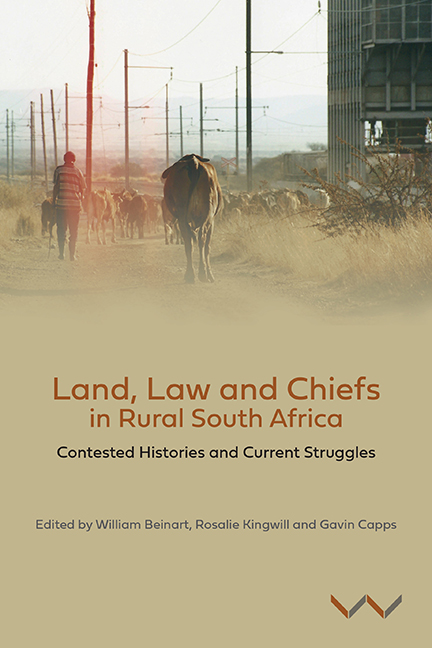Book contents
- Frontmatter
- Contents
- Maps
- Acronyms and Abbreviations
- Preface
- Introduction Land, Law and Chiefs: Contested Histories and Current Struggles
- Chapter 1 Constitutional Court Judgments, Customary Law and Democratisation in South Africa
- Chapter 2 Was ‘Living Customary Law’ There All Along?
- Chapter 3 When Custom Divides ‘Community’: Legal Battles over Platinum in North West Province
- Chapter 4 Chiefs, Mines and the State in the Platinum Belt: The Bapo-ba-Mogale Traditional Community and Lonmin
- Chapter 5 Mining, Graves and Dispossession in Mpumalanga
- Chapter 6 The Abuse of Interdicts by Traditional Leaders in South Africa
- Chapter 7 Resisting the Imposition of Ubukhosi: Contested Authority-Making in the Former Ciskei
- Chapter 8 Black Landlords, Their Tenants and the Native Administration Act of 1927
- Chapter 9 Customary Law and Landownership in the Eastern Cape
- Chapter 10 A History of Communal Property Associations in South Africa
- Chapter 11 ‘This is Business Land’: The Hlolweni Land Claim, 1983–2016
- Chapter 12 Restitution and Land Rights in the Eastern Cape: The Hlolweni, Mgungundlovu and Xolobeni Cases
- Contributors
- Index
Chapter 5 - Mining, Graves and Dispossession in Mpumalanga
Published online by Cambridge University Press: 15 June 2021
- Frontmatter
- Contents
- Maps
- Acronyms and Abbreviations
- Preface
- Introduction Land, Law and Chiefs: Contested Histories and Current Struggles
- Chapter 1 Constitutional Court Judgments, Customary Law and Democratisation in South Africa
- Chapter 2 Was ‘Living Customary Law’ There All Along?
- Chapter 3 When Custom Divides ‘Community’: Legal Battles over Platinum in North West Province
- Chapter 4 Chiefs, Mines and the State in the Platinum Belt: The Bapo-ba-Mogale Traditional Community and Lonmin
- Chapter 5 Mining, Graves and Dispossession in Mpumalanga
- Chapter 6 The Abuse of Interdicts by Traditional Leaders in South Africa
- Chapter 7 Resisting the Imposition of Ubukhosi: Contested Authority-Making in the Former Ciskei
- Chapter 8 Black Landlords, Their Tenants and the Native Administration Act of 1927
- Chapter 9 Customary Law and Landownership in the Eastern Cape
- Chapter 10 A History of Communal Property Associations in South Africa
- Chapter 11 ‘This is Business Land’: The Hlolweni Land Claim, 1983–2016
- Chapter 12 Restitution and Land Rights in the Eastern Cape: The Hlolweni, Mgungundlovu and Xolobeni Cases
- Contributors
- Index
Summary
At Tweefontein Colliery Complex, 25 km south-west of Witbank in Mpumalanga province, lie graves that will be impacted by multinational commodities and mining company Glencore PLC (Glencore) open-cast coal mine expansion plan. The Tweefontein farm, and several other farms such as Boschmansfontein and Klipplaat, are sites of formal and informal cemeteries with graves that belong to former migrant labourers and labour tenants from South Africa and Mozambique. The change of Glencore's mining method from underground to open-cast mining disturbs about a thousand graves, which are legally protected by the National Heritage Resources Act, Act 25 of 1999 (NHRA). The negotiations about the grave relocations began with the affected families in 2011, but the relocations commenced in 2012, before these were concluded. This ignited a dispute between the mine and the owners of the graves.
South Africa's Mineral and Petroleum Resources Development Act, Act 28 of 2002 (MPRDA) gives particularly strong rights over land to those who are licensed by the state to mine (see Capps, Beinart in this volume). While contradictions between mining legislation and the heritage law provide a context to the contestations over graves, this chapter explains why grave relocations are sensitive from the perspective of the owners of the graves. I draw on interviews to argue that ancestral remains are mediators of life and death for the living. They are evidence of a history that is entangled with narratives of land dispossession, restoration and contested forms of evidence in the current political dispensation. Graves validate belonging for those whose status was historically disregarded. I first present a description of the grave relocation process and then explore the idea of graves as a body of evidence in the post-apartheid era.
To explain why graves are subject to contestations, my interviews delved into the families’ experiences of the removal of their ancestral graves and the reburial of their remains. My questions probed, amongst other things, ideas and issues related to consultation, access to information and awareness of legal cultural rights. I also intended to evaluate inconsistencies and irregularities in the application of legal provisions in the NHRA and MPRDA. I conducted 14 interviews with the families whose graves were relocated by Glencore. It was imperative to first understand why the deceased were buried on the Tweefontein farm.
- Type
- Chapter
- Information
- Land, Law and Chiefs in Rural South AfricaContested histories and current struggles, pp. 104 - 120Publisher: Wits University PressPrint publication year: 2021



